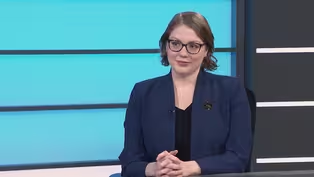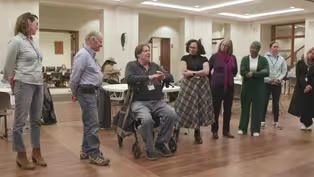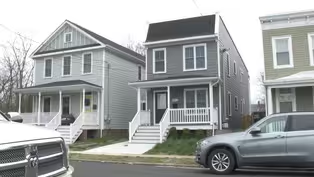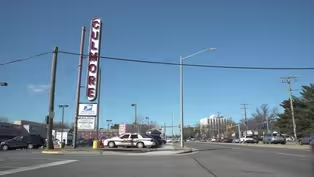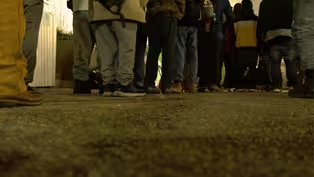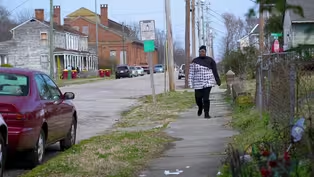VPM News Focal Point
The Price of Poverty | February 29, 2024
Season 3 Episode 2 | 26m 46sVideo has Closed Captions
What is the additional cost of being poor in Virginia?
People with lower incomes often pay more for loans, insurance and credit cards. What is the additional cost of being poor in Virginia? We examine the impact of poverty on mental health and learn about programs to reduce poverty.
Problems playing video? | Closed Captioning Feedback
Problems playing video? | Closed Captioning Feedback
VPM News Focal Point is a local public television program presented by VPM
VPM News Focal Point
The Price of Poverty | February 29, 2024
Season 3 Episode 2 | 26m 46sVideo has Closed Captions
People with lower incomes often pay more for loans, insurance and credit cards. What is the additional cost of being poor in Virginia? We examine the impact of poverty on mental health and learn about programs to reduce poverty.
Problems playing video? | Closed Captioning Feedback
How to Watch VPM News Focal Point
VPM News Focal Point is available to stream on pbs.org and the free PBS App, available on iPhone, Apple TV, Android TV, Android smartphones, Amazon Fire TV, Amazon Fire Tablet, Roku, Samsung Smart TV, and Vizio.
Providing Support for PBS.org
Learn Moreabout PBS online sponsorshipANGIE MILES: Some of us, some of our neighbors are working hard, but still struggling to cover basic necessities.
What is the price we pay as a society and as individuals when for so many, theres simply not enough money?
We'll examine the mental health impact, hear from those who have faced this challenge for years and contemplate what exactly might make things better.
It's time for VPM News Focal point.
Production funding for VPM News Focal Point is provided by The estate of Mrs. Ann Lee Saunders Brown.
And by... ♪ ♪ ANGIE MILES: Welcome to VPM News Focal Point.
I'm Angie Miles.
We are talking about the price of poverty.
Within a culture of relative affluence there are individuals and groups that aren't earning enough to keep pace with their essential expenses.
We'll examine what life is like for these Virginians and consider some of what's being done to help eliminate poverty.
We begin in Northern Virginia, which has witnessed booming economic development for years, but not everyone is benefiting from that boom.
Many residents are still living in areas that some describe as “islands of disadvantage.
” Multimedia Reporter, Billy Shields, brings us this story.
BILLY SHIELDS: Federico Perez makes his way from his apartment to the Culmore Support Center in Fairfax County.
The food bank there is one of the services he uses.
It's one of several services offered by an outreach organization called Second Story.
(Federico speaking in Spanish) BILLY SHIELDS: He says he can't work now after an accident left him needing a crutch to walk.
Perez's wife is covering the rent at their apartment, which he says is almost $1,700 a month, rent which he says they can barely afford.
(Federico speaking in Spanish) JADE LEEDHAM: Fairfax County is definitely an affluent county, and there is a myth that there is no poverty.
And Culmore happens to be one of the islands of disadvantage.
BILLY SHIELDS: An “island of disadvantage.
” It's a term used by Dr. Steven Woolf to explain the disparities in the area.
STEVEN WOOLF: In some of these neighborhoods, it's Third World living conditions.
BILLY SHIELDS: Culmore is largely an enclave of migrants in the Bailey's Crossroads area on Leesburg Pike.
A lot of the apartments here house more than one family.
STEVEN WOOLF: They often have to spend a tremendous amount of time in multiple jobs in order to bring in an adequate income to meet their expenses.
SORAYA BORJA: The high prices of the rent is what is affecting them the most.
BILLY SHIELDS: But go three miles down the same road and it becomes Broad Street in Falls Church.
There you'll find homes like this one, valued by Zillow at $1.7 million.
And the economic disparities in this area are stark.
Those who have better living conditions also have a longer life expectancy.
STEVEN WOOLF: Northern Virginia has a 17-year gap in life expectancy.
BILLY SHIELDS: In other words, a resident living on one side of this fence has a life expectancy that's 17 years less than someone living just down the road.
STEVEN WOOLF: People have a misconception that health is determined by healthcare, and in actuality, what really shapes our health are our living conditions.
BILLY SHIELDS: Perez is just taking it one step at a time, trying to keep the roof over his head while living on an “island of disadvantage.
” For VPM News Focal Point, I'm Billy Shields.
(door creaks) ANGIE MILES: Those disparities extend to employment and education as well.
In Woolf's study unemployment was more than 6% higher and high school graduation rates more than 17% lower in low income areas of Northern Virginia when compared with the region taken as a whole.
ANGIE MILES: In the United States as well as globally, the number of millionaires has grown steadily over the past decade.
Nearly 7% of Americans now have financial assets worth more than a million dollars.
At times there seems to be a cultural fascination with wealth, but does our society look down on those who don't have money?
We ask people of Virginia, whether America discriminates against people considered to be poor.
ALICE AMORY: Well, I mean the, the market is all about what you can buy and, you know, if you don't do this, then you're, who are you?
If you can't buy this, you're, you know... FRAN ENGLISH: Oh, you can see it when you, they kind of write you off a lot of times when you like, go to the doctors or whatever, they kind of bypass you.
Sometimes some do.
SETH MORITZ: It definitely causes issues in applying for jobs, finding people that are quote unquote qualified or not qualified.
Job applications, asking for X amount of years of experience and for someone who is financially strapped or comes from, has little education, it's very hard to, you know, even beginning to like, look where to apply for a job when they have all these prerequisites.
JOSH RAYMOND: Well, I feel that most people don't support the people who have financial issues because it's more along the lines of I got to get money, got to pay bills, got to pay the house payment.
CARRIE LILLARD: I think in general, there's just the belief that you should like, have money and have resources and you should know these things.
ANGIE MILES: Other people's judgments can weigh on a person's mental well-being.
Besides possible discrimination, the constant stress of not having enough can extend beyond financial hardship and have a profound effect on how someone feels.
In Richmond, nearly 20% of residents are living in poverty.
Multimedia Reporter Keyris Manzanares reveals more about the stress, anxiety, and social isolation that many of them experience.
WOMAN 1: won't be there until until after we serve food.
KEYRIS MANZANARES: Blessing Warriors is a Richmond nonprofit dedicated to helping people living in poverty 24 hours a day, 7 days a week.
TRACY BYRD-EAGLES: Our mission is to meet people where they are.
You never know how somebody ended up on the street.
We don't judge.
We don't criticize.
Our goal is to motivate you to find a way up and out of where you are.
KEYRIS MANZANARES: Tracy Byrd-Eagles says there's no face to poverty.
Blessing Warriors RVA has grown into a Facebook group with over 8,000 members, which could seem small to some, but they seem to do it all.
On Tuesdays, Blessing Warriors arrive at St. Paul's Episcopal Church to provide hot meals and essential items to those experiencing homelessness.
TRACY BYRD-EAGLES: This is totally an operation of love.
It is totally a selfless organization.
We are 100% funded by people in the community.
VOLUNTEER 1: All right, friend, there you go.
MAN 1: Thank you very much.
VOLUNTEER 1: You're so welcome.
KEYRIS MANZANARES: But addressing poverty isn't just about providing a financial lifeline, it's also about easing stress.
TRACY BYRD-EAGLES: You know, it's tough on the mental health when you start out on the street.
And whether that start out on the street is an eviction, and you go to a hotel room, and from a hotel room, you end up on the street, whether you're on the street from the beginning, your soul takes a hit.
KEYRIS MANZANARES: Kimberly Myris and her fiance Jonathan know what it's like.
Last year when they were expecting their first child together, they were living in a tent.
KIMBERLY MYRIS: I had a good paying job in my field, you know?
I had a vehicle back then.
I could manage my money back then, but it gets harder and harder.
A lot of it has to do with credit score.
People always want to know about your credit score.
They're always so focused on what happened in the past, you know what I'm saying?
Instead of how you can get out of it.
KEYRIS MANZANARES: Myris says she tries to stay positive as she juggles the pressures of poverty and the responsibilities of parenthood.
KIMBERLY MYRIS: We aren't the people who stand on the corner.
We aren't the people who just sit around and be like, "Hey, man, you got a..." We don't.
We still go to work, you know?
We earn our money, what we have.
We don't earn a lot, so we need help.
KEYRIS MANZANARES: Health Brigade, formerly Fan Free Clinic, is one of those helpers.
They started out in 1970 with an holistic approach to health and wellness.
Jenee Johnson works with other licensed counselors and support staff to provide social work services to clients.
She says the price of poverty isn't always monetary.
Often, people are forced to compromise their quality of life.
JENEE JOHNSON: The price is an enormous price because it wreaks havoc on somebody from a psychological aspect as well as an emotional aspect.
Folks who are living in poverty are in this cyclical experience where not having food, not having childcare, not having healthcare, not having all of our basic needs met causes prolonged stress.
And so, you know, the cortisol hormone, for example, is elevated.
And as a result of that being elevated over time, an individual develops other problems, so high blood pressure, heart attack, stroke, digestive issues.
And then on the mental health side of things, we start to get into worry and sadness.
KEYRIS MANZANARES: And that's why Blessing Warriors RVA continue to show up.
For VPM News, I'm Keyris Manzanares.
ANGIE MILES: The Myris family is currently living in a shelter outside Richmond.
Volunteers with Blessing Warriors RVA say they continue to serve approximately 300 people each day.
The majority of them are in Richmond, Chesterfield, and Henrico.
ANGIE MILES: VPM News Focal Point is interested in the points of view of Virginians.
To hear more from your Virginia neighbors, and to share your own thoughts and story ideas, find us online at vpm.org/focalpoint.
ANGIE MILES: There's a saying you might have heard before, banks only lend money to people who don't need money.
In other words, you have to have an acceptable credit profile to be considered credit worthy by traditional lenders.
Where does that leave everyone else?
Americans living paycheck to paycheck are spending $25 billion every year on “junk fees.
” These fees found in subprime credit cards, payday loans, inflate the cost of borrowing money.
We spoke with individuals who spent years wrestling with scarcity.
They were gracious in offering to explain why getting onto firmer financial footing is not as simple as it may seem to those who are not struggling financially.
ANGIE MILES: It started with an empty refrigerator.
LOVE DIXON: At age four, I was taken away from my mom due to poverty.
It was a neglect charge due to not having enough food in the refrigerator.
Someone was upset with my mom and called CPS and we were taken away from her, placed in a home.
ANGIE MILES: Love Dixon says this is what sent her and her sister into the system where she says she'd traded her mother's love for instability and abuse.
LOVE DIXON: I was aged out of foster care at 18, so I was basically homeless and had no one, so I had to figure out how I could survive at that point.
ANGIE MILES: But she says she had no real skills, no support network, not even a high school diploma, so she says she took GED classes over and over again.
LOVE DIXON: Once I came to Richmond, took me some time because I didn't have enough money to pay for the test, which was $56.
That may not be much for some people, but at the time I was struggling.
ANGIE MILES: Dixon has also known homelessness.
She says despite having excellent credit and no negative rental history, her small disability check and supplemental income were not close to three times the rental amount required for most apartments.
LOVE DIXON: At times, I was living with strangers.
I went on Craigslist at the time and these things didn't work out because one person was like, "I just want your money.
I don't want you here."
Some people didn't want me to use their refrigerator.
If you don't have a refrigerator or can't use the kitchen, those things are essential for actually saving money.
ANGIE MILES: So having to buy food that was more expensive and often less healthy than what she might prepare, and having to endure the unkindness of random roommates, Dixon shares her story now with the desire to help those who've never experienced poverty, to understand more and maybe discriminate less against those who feel like outsiders because their pockets are mostly empty in a country where they are surrounded by relative wealth that many take for granted.
LOVE DIXON: Like transportation, I walked a lot, late for places that I needed to be.
Found out that I had to be super early 'cause I never knew what was going to happen.
And then some places were dangerous to walk.
I had to really suck it in and just go to where I need to go and block out everything, you know, protect myself.
So it is like nobody should be hungry 'cause there's so many food banks.
However, you have to walk to the food bank, you have to get there on time and you might be at work.
I had a big duffle bag suitcase with wheels on it, so I had to put all of my food in that duffle bag with wheels on it and tug it along, sometimes four miles to where I lived because they weren't in in my area.
I felt ashamed.
Sometimes I would tell people, 'I'm a person too.
I'm a person too.'
It was dehumanizing.
You know, even when I went to school, J. Sargeant Reynolds and VCU at one point, and I was grateful for being in these spaces and I saw how they didn't think about the things that I was thinking about at the time.
They was like, "Why is your stomach always hurting?"
And I didn't want to tell anyone, but my stomach was hurting because I was taking medicine without food.
ANGIE MILES: Dixon says things are better now, as she's acquired more skills and work experience and expanded her support network.
She can barely count on just one hand the number of jobs she works, many of them centered on helping others.
Even as she continues moving forward, Dixon has known financial struggle all her life.
DEBBIE WEBB: I know what it is to have a demon on you and you can't seem to shake it.
ANGIE MILES: For Debbie Webb, the darkness of drug addiction descended upon her.
DEBBIE WEBB: I was married for 25 years.
I lost all seven of my kids.
I went through not paying my light bill because I chose to smoke drugs.
I went through stealing from my mom.
I did a lot of things that I wasn't supposed to do, but- ANGIE MILES: Webb is quick to accept responsibility for the choices she's made and the consequences that have derailed her time and time again, yet financial strife can make its way to anyone, even the most responsible, especially if they have no support network available to help.
KARL STEWART: There is no one reason why people find themselves in need of help, but if people find themselves in need of help, the power, the strength is that there's someone to help 'em.
ANGIE MILES: Webb has found her way forward because she says of this rescue mission in Roanoke where they serve up sustenance for the mind and spirit for hundreds who have unmet needs.
KARL STEWART: It begins with recognizing that the person across from you can be and could be you.
That it is us and we, and that it's not just that individual's challenge, but it's yours as well because you could be in that position.
And I think for all of us, if we find ourselves in an emergency, whatever it might be, the greatest good is done when we realize that there are other people who want to help.
MAN 1: How are ya?
KARL STEWART: Come on in, hey, come, guys.
ANGIE MILES: Karl Stewart mentors, encourages, and helps provide hope, which he says is the crucial requirement that allows those exhausted by struggle to keep going in the quest to build better lives.
KARL STEWART: What if your income couldn't support the insurance for a car or money to fix it?
Now you have to consider not only I can't get to the store, I can't get to my job, and buses don't run seven days a week.
Then think about this, identification.
It's not just one ID, you need two.
Suppose you don't have that.
Without that, you can't get a bank account.
We assume everybody has a smartphone.
We assume everybody has the ability to get to a computer to fill out a job application.
As long as people have hope, as long as they have an opportunity to believe that things can be better, I believe people will do better.
And some of the challenges then that we see, like substance abuse, some of the symptoms that are publicized that deal with poverty, I believe those things will be abated.
They'll go away simply because people have hope and it's a powerful cure for a lot of things that we see.
DEBBIE WEBB: My apartment is right around the corner.
Not only that, I have a job.
And the cocoon, it's just growing, growing, growing and there's a butterfly coming about because all that I've went through through this program.
ANGIE MILES: Love Dixon is on that journey as well.
Newly married and with a place to call home, yet she urges others to recognize that poverty is not something that most people actively choose, that being without money and without support, complicates life in ways that are hard to grasp unless you've walked in those shoes that can't afford to stop and rest, that having to pay more to accept less and go without is... LOVE DIXON: Exhausting.
You have to be very creative.
You have to think on your feet.
And not only a physical battle, it's a mental battle.
Even if you don't care what people think, you still have to do the things you need to do to survive.
ANGIE MILES: And ultimately, the cost is counted in dollars, but the constant stress also exacts a price from the minds, bodies, and spirits of those who walk that hard road.
ANGIE MILES: For financially strained Americans, it's unexpected expenses that wreak the most havoc, bank overdraft fees, higher interest rates, having to travel farther to reach grocery stores, medical care, and other services mean those who can least afford it are often required to pay more for basic needs.
You may be asking yourself, is poverty driven by poor decision-making?
A 2023 Columbia University study considered this question and found the answer was, “No.
” Scarcity is the biggest driver of all decision-making by those who don't have adequate resources and questionable decision-making is a reality across all economic strata.
ANGIE MILES: More than one in six American children under the age of five is living in poverty.
Those stressors during the early years can set the stage for a lifetime of financial struggle.
Access to high-quality early education may be a key to breaking that cycle.
Rachael Deane, CEO for Voices for Virginia's Children, is joining us.
Voices has been known for years also as the home of the KIDS COUNT reports for Virginia.
Could you describe for us what that report is and what some of the big headlines are from the most recent edition?
RACHAEL DEANE: The KIDS COUNT Data Center allows us to track dozens of indicators of child well-being across time so that we know how kids are doing in Virginia.
Unfortunately, though, recent data suggests that child poverty is on the rise, particularly since the pandemic.
ANGIE MILES: Now, we talked about early childhood education as a possible fix for this, or at least a remedy that can improve the situation for children who grow up in poverty.
What is the situation with that today?
RACHAEL DEANE: Access to early care and education during those first five years of life has the ability to remedy some of the adverse effects of poverty.
In Virginia, we have a ways to go.
We are, like many states, struggling in the wake of the pandemic and with the expiration of federal childcare subsidies and grants to help stabilize our our childcare sector.
So at Voices, we are advocating for increased investment into the early care and education sector, and increased compensation for our very highly qualified early education workforce.
ANGIE MILES: Rachael Deane, CEO of Voices for Virginia's Children.
Thank you so much for joining us today.
RACHAEL DEANE: Thanks for having me.
(upbeat music) ANGIE MILES: You can watch the full interview on our website.
ANGIE MILES: A nonprofit called Circles RVA has found a way to help end the cycle of poverty by establishing social networks to break through barriers.
It's part of a national program where participants are paired with volunteer mentors who build connections and community that can be life-changing.
They see intentional relationships as a tool to help reduce poverty.
Producer Pam Hervey brings us this story.
WOMAN 1: Joy has given you all a Career Pathways Plan.
If you haven't gotten it, you're going to get one, I promise.
LISA SPECTER-DUNAWAY: The plainest way I can describe it is that Circles works with people who are tired of living paycheck to paycheck and they are motivated to make change for themselves and their families, and they're leading that change, which is why we don't call them program participants, they are our leaders.
They are matched with allies who are there to be their accountability partner, their coach.
So the magic of Circles RVA really is that it's based on relationships.
JOY THOMAS: When I first started with Circles, I really didn't know that it was a poverty program, it was a big eye opener.
Dealing with some of those barriers and things, and overcoming some of the barriers that was causing me not to have the money that I say I wanted to have.
For me, it's the connection with their allies and building that community together and having somebody hold you accountable.
WOMAN 1: I want you to think beyond, because the goal is to get you to the highest level, whatever that is for you.
LISA SPECTER-DUNAWAY: For leaders and allies, they start with either an eight or a 12 week training program, and that's every Tuesday.
And they look at their goals, the S.M.A.R.T.
goals, what has their progress been, what are the roadblocks, what is their budgeting looking like, and how can the allies support the leaders and how can they also celebrate the progress?
HANNAH CONAWAY: I was actually told about it through my therapist and she just recommended that it might be a good program to just help get us more financially on our feet, more stable.
So my ally is Laura.
I love her.
She is becoming my best friend.
LAURA BLACKWELL: I think a lot of people who are in this program have a lot of trauma, even if I'm just giving her emotional support, that encourages her in ways that I never thought and I never thought I could help someone just by saying, 'Hey, I'm here for you.'
I think a lot of people need that when they're trying to get out of any hard situation.
LISA SPECTER-DUNAWAY: So every Tuesday we're here and we have dinner together.
The second Tuesday of each month is a programming night, and so it could be job readiness, it could be practicing interviewing, it could be thinking about a different career path.
What are the things that you're good at and passionate about that you may never have thought of that would be something that is attainable for you?
HANNAH CONAWAY: One of the goals we've actually already achieved, so it was to get better housing and we just recently moved into a new apartment.
It's definitely going to be a work in progress, but so far it is going really well.
WOMAN 2: I'm just grateful to be here.
LISA SPECTER-DUNAWAY: Change is really hard for everybody and so when you have someone who is your partner walking along with you, then that helps reinforce the change, 'cause we're all people and we all need to have the number of relationships and we need to have family and we need to have enough resources so that we can thrive, not just survive.
ANGIE MILES: Of course, the less financially burdened people become, the more individual energy, creativity, and productivity they can offer to the wider community.
We hope our program has provided some insights for you and we invite you to find these stories and additional resources on our website, vpm.org/focalpoint.
You can also find a story about a local group addressing affordable housing, as well as the full interview with Rachael Deane.
Thank you for watching and we'll see you next time.
Production funding for VPM News Focal Point is provided by The estate of Mrs. Ann Lee Saunders Brown.
And by... ♪ ♪
Are kids the key to solving poverty?
Video has Closed Captions
Clip: S3 Ep2 | 8m 20s | Prioritizing our children may be the key to addressing our nation’s poverty problem. (8m 20s)
Building community to end the cycle of poverty
Video has Closed Captions
Clip: S3 Ep2 | 3m 27s | Ending the cycle of poverty by establishing social networks to break through barriers. (3m 27s)
A housing rental program helps families move out of poverty.
Video has Closed Captions
Clip: S3 Ep2 | 7m 55s | Urban Hope, a faith-based non-profit in Richmond provides affordable rental housing. (7m 55s)
Video has Closed Captions
Clip: S3 Ep2 | 2m 15s | Northern Virginia is an economic boomtown. Others live on “Islands of Disadvantage". (2m 15s)
The mental toll of living in poverty
Video has Closed Captions
Clip: S3 Ep2 | 4m 6s | Mental health under poverty’s weight (4m 6s)
Video has Closed Captions
Clip: S3 Ep2 | 7m 39s | Those who’ve struggled with poverty provide insight about why it’s hard to shake it (7m 39s)
Providing Support for PBS.org
Learn Moreabout PBS online sponsorship
- News and Public Affairs

Top journalists deliver compelling original analysis of the hour's headlines.

- News and Public Affairs

FRONTLINE is investigative journalism that questions, explains and changes our world.












Support for PBS provided by:
VPM News Focal Point is a local public television program presented by VPM
